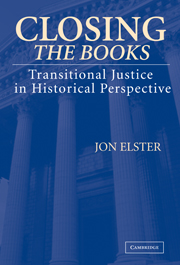9 - Politics
Published online by Cambridge University Press: 17 November 2009
Summary
INTRODUCTION
Politics may impinge on transitional justice through “pure political justice” and through political interference with legal justice (Chapter 4). In such cases, the political decisions emanate from the executive. In this chapter, I focus on the role of political parties in shaping transitional justice, either as an end in itself or as a means to realize other goals. Although I mainly deal with assembly politics, I also consider extraparliamentary or revolutionary politics.
The influence of political parties can be decisive but may also be limited by other political actors. In some contexts, parties take second place to the executive. In France in 1815, the King controlled legislation at both ends, having both the monopoly of initiative and the right to veto amendments. In Belgium, an anomalous situation arose in March 1945 when parliament delegated the right to govern by decrees to a coalition government of national unity. The left-wing government that replaced it retained the full powers and used them to enact the decree of civil degradation that deprived tens of thousands of citizens of many basic rights. Although this bypassing of parliament was formally legal, it was widely seen as a violation of unwritten rules of the game.
The political parties may also be constrained by an occupying power, as in Germany and Italy at the end of World War II. In Germany, the Allies retained formal control until 1954.
- Type
- Chapter
- Information
- Closing the BooksTransitional Justice in Historical Perspective, pp. 245 - 272Publisher: Cambridge University PressPrint publication year: 2004



